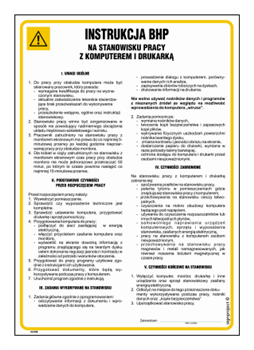Health and safety in remote work

Remote work has existed in many sectors (such as IT, graphics, marketing, commerce) for many years, although it was only the Covid-19 pandemic that forced a change in the Labor Code and legal regulation of this employment model (amendment to the Labor Code on December 1, 2022.). Currently, the rules, regarding the performance of remote work, so-called telework, can be found in Art. 675 of the Labor Code.
What is remote working?
This is a type of work, carried out wholly or partially (so-called hybrid work) in a place agreed upon by the employee and the employer (e.g., at the employee's home address, in a co-working space), using means of direct communication at a distance (e-mail, telephone, etc.), and using the means of direct communication at a distance.).
Determining where work is to take place is intended to help control the performance of duties.
Due to the nature of the work, not everyone can do remote work (where it is necessary for the employee to be in a specific location - example: driver, construction worker, production worker). There are also legal contraindications for remotely performing work that is particularly hazardous, for example, that results in exceeding the permissible standards of physical factors set for living quarters, work involving a substance or mixture harmful to health or technological processes, work involving the use or release of substances poisonous, infectious, radioactive, irritating or sensitizing.
Who can decide to work remotely and under what circumstances?
Both the employee and the employer can take the initiative to perform remote work. This decision can be made both at the outset of the employment contract and during the course of employment.
There are two cases in which the other party must agree to work remotely:
- Employer has the option to forcibly send an employee to work remotely while the state is in effectepidemic threat and for a period of 3 months after its cancellation, as well as during the period when it is temporarily impossible for the employer to provide adequate health and safety conditions at the workplace due to force majeure. Currently in Poland there is an ongoing state of epidemiological emergency.
- The employer is forced to agree to remote work if the employee is pregnant, raising a child under the age of 4, or caring for an immediate family member with a disability certificate.
Regulations for remote work
Remote work may be defined by a number of rules, although, on the other hand, the legislator has left quite a lot of freedom to the employer to set them, especially when it comes to reimbursing the costs of remote work (such as electricity).
For example, you can specify:
- which group of employees has the opportunity to work remotely
- the rules for the company to cover the employee's costs incurred in connection with remote work
- rules of communication between employer and employee / between employees
- how the control of the performance of the person working remotely (including his presence), health and safety control, or control of information security (m.in. personal data).
Obligations of the employer in case of remote work
The employer has an obligation:
- provide the employee with the materials and work tools necessary to perform remote work (computer, phone, etc.).) - however, the parties may jointly agree that the employee use his own equipment for this purpose
- provide installation and service of these work tools or reimburse the employee for the costs incurred
- cover the cost of electricity/telecommunications services that are necessary to perform remote work (with the understanding that if the employee receives this cash equivalent, the employee will not have to pay tax on these funds, as they do not constitute revenue income within the meaning of the Law of 26.7.1991. on personal income tax - t.j. OJ.U. of 2021. pos. 1128).
If remote work is provided on an occasional basis, there is no obligation to sign an agreement between the parties or reimburse the employee.
Rights of the remote worker
A remote worker has the same status as a stationary worker and is entitled to:
- equal treatment of employees with regard to the establishment and termination of the employment relationship, terms and conditions of employment, training and promotions
- prohibition against discriminating against an employee for performing remote work or refusing to work remotely
- the right to be on the premises of the workplace and to use the employer's equipment, premises and facilities.
Control of the remote worker
The employer has the right to:
- control of the performance of remote work (at the direction of the employer, the employee is required to keep a record of the work performed)
- health and safety inspections
- control compliance with information security requirements (for this purpose, internal procedures for the protection of personal data should be developed in advance)
This inspection may be carried out at the place of remote work, that is, in the employee's private apartment (respecting his privacy) and during working hours, but the date should be announced in advance.

